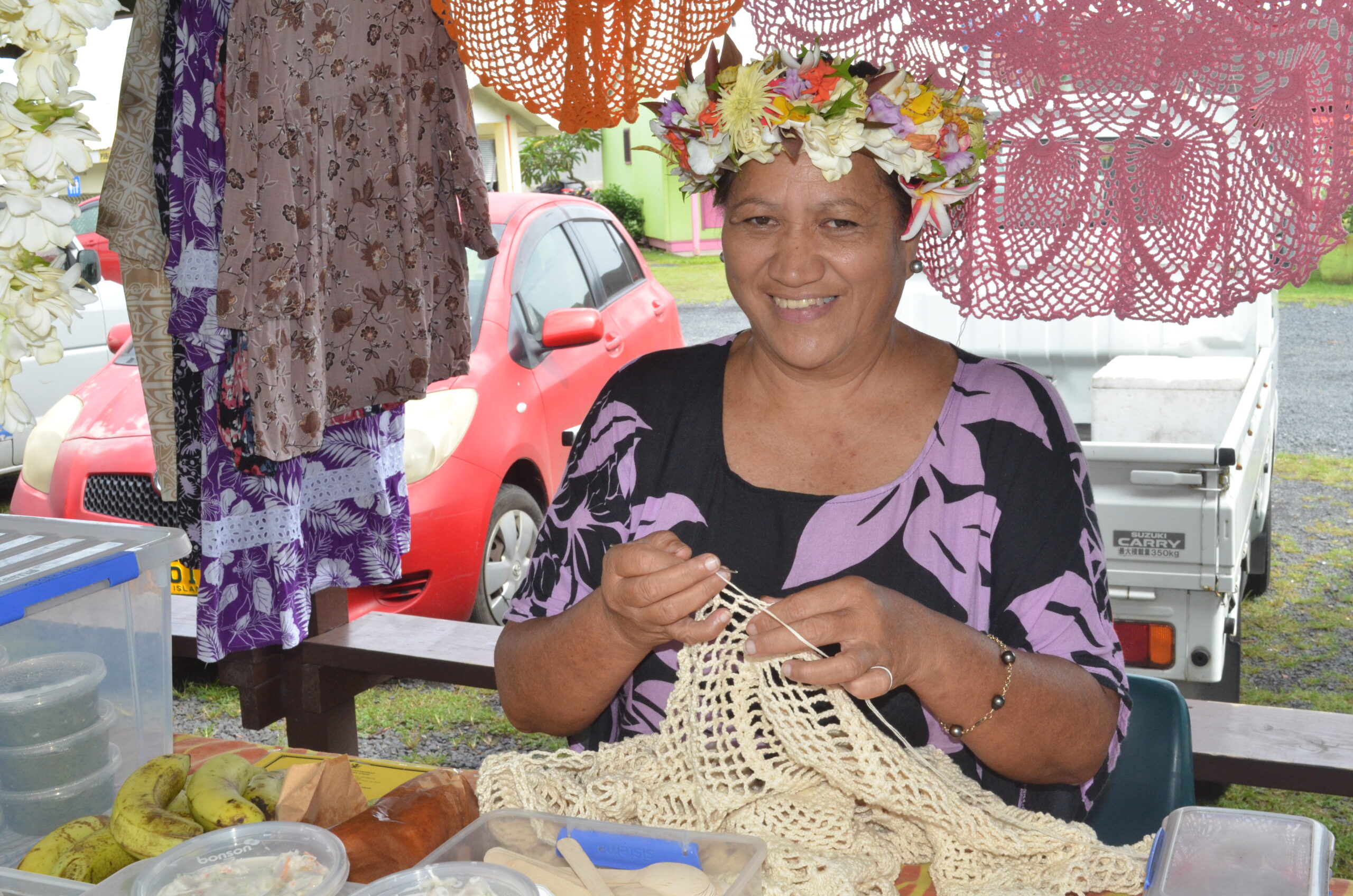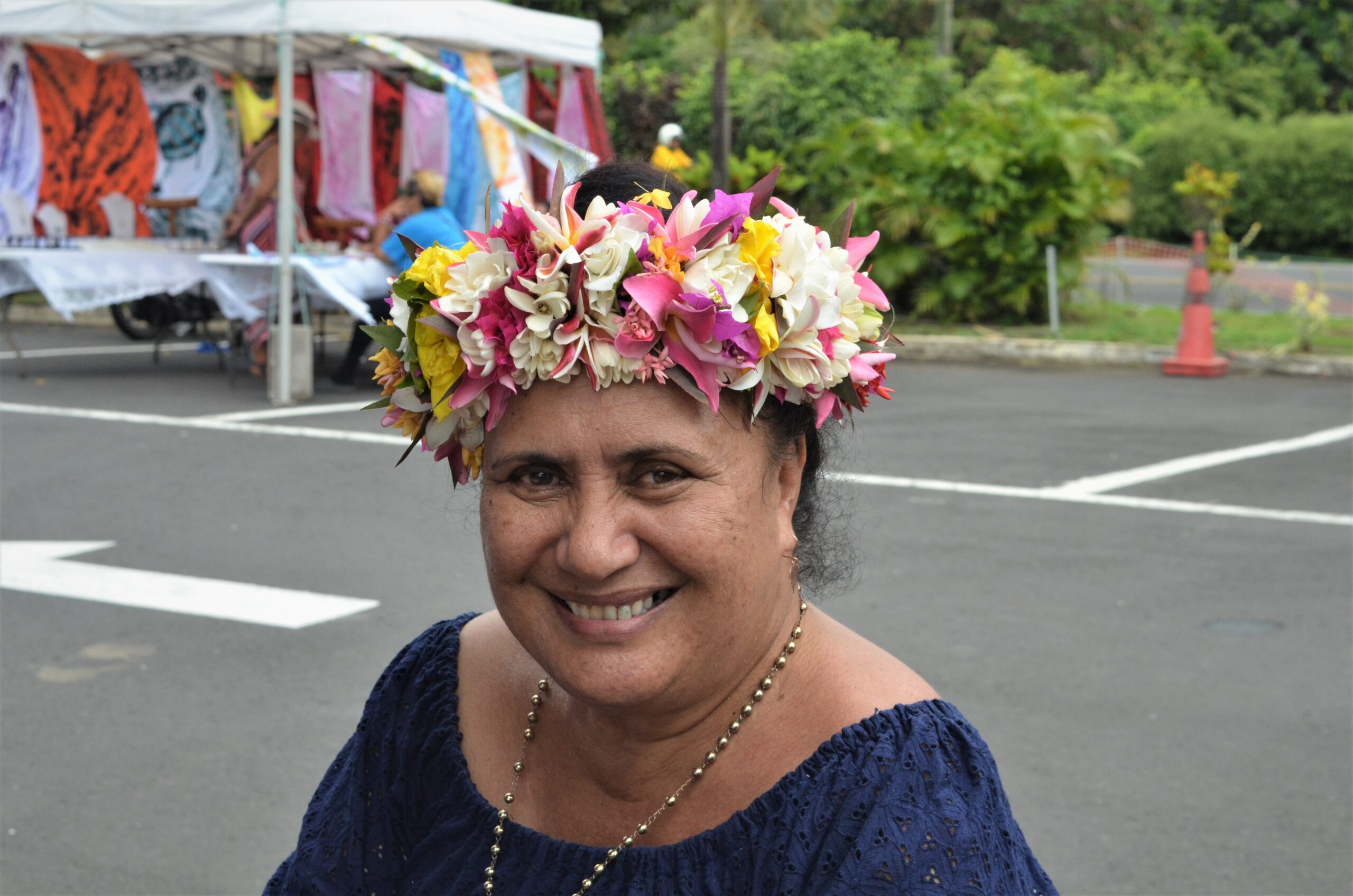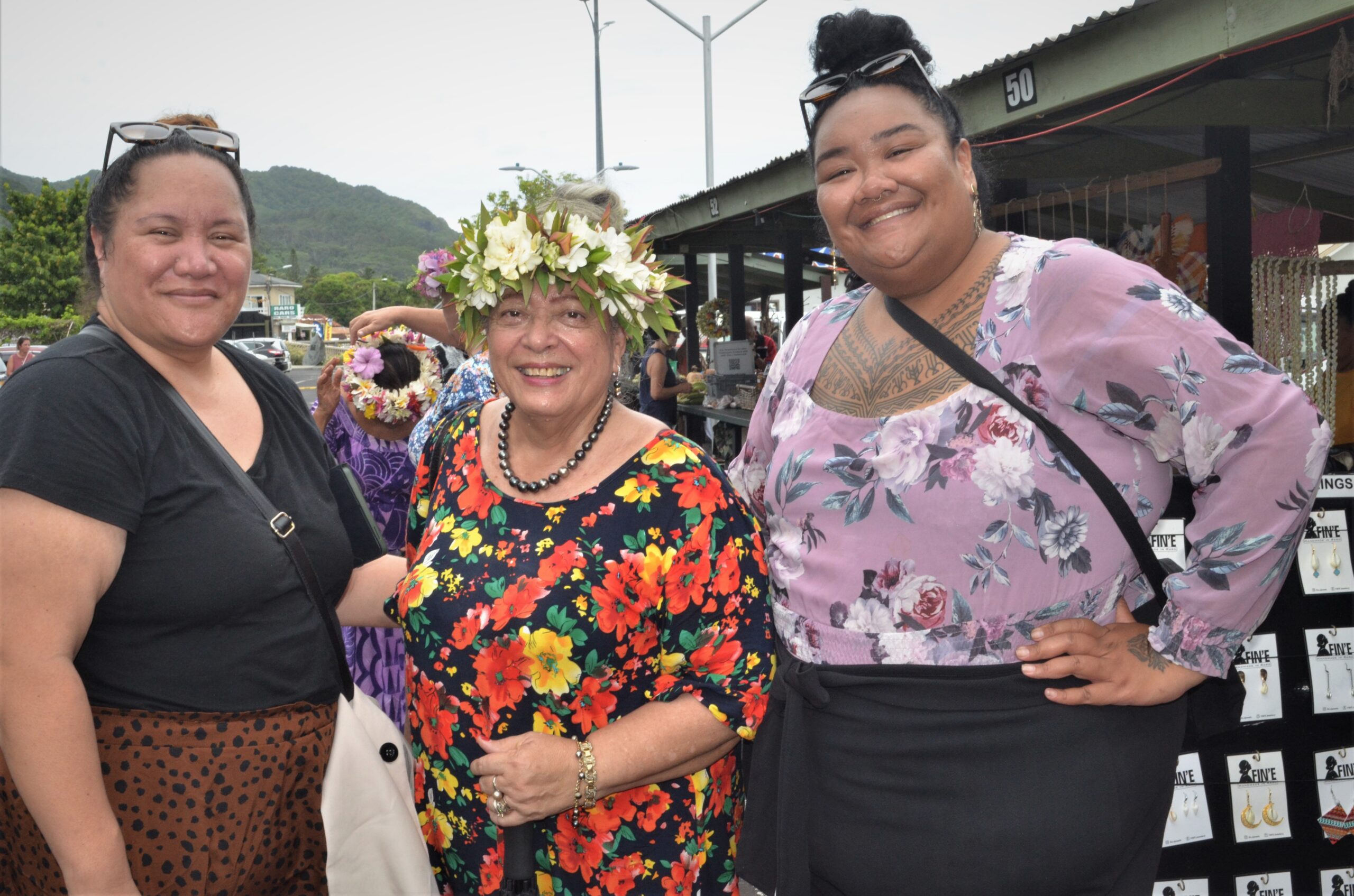Celebrating progress: Cook Islands women share stories of success
Saturday 9 March 2024 | Written by Melina Etches | Published in Features, Weekend

Matangaro Mokoroa, a regular vendor at the Punanga Nui Market, crochets while waiting for customers on the International Day of Women. MELINA ETCHES/24030803
The International Day of Women was celebrated across Rarotonga including workplaces celebrating the theme of ‘Te Vaine kia turu’ia: Tupu’anga kia Tere – Invest in Women: Accelerate Progress and Inspire Inclusion’.
The morning started off with a special mass at the St Joseph’s Cathedral that was attended by Police women and the Cook Islands Sports and National Olympic Committee (CISNOC) staff.
At 10am, the Cook Islands National Council of Women (CINCW) kicked off their event at the Punanga Nui Market led by its president Vaine Wichman and emcee of the day, coordinator Taputu Mariri.
Wichman shared that her morning message to her daughter was: “I’m celebrating this day because of you… you stand in the line of great women who have passed on.”
Her grandmother, who never went to school, had defied the odds and had managed to keep a premature baby alive and survive; back then there were no incubators.

Vaine Wichman, president of the Cook Islands National Council of Women, celebrates International Day of Women at the Punanga Nui Market. MELINA ETCHES/24030818
Wichman’s mother opened the first Early Childhood Centre in Vaimaanga, which over 20 children in the village attended.
She became the first woman executive officer for the island of Penrhyn and assisted with the New Zealand, Australian, British, American, and Chinese joint military exercise to build a fuel farm for Te Kukupa.
“Young women will become whatever they decide to become because women in the shadows have cleared the debris along their journey and so it will be a bit easier,” said Wichman.
CINCW held their event at the market, a hub for enterprising women selling produce and products to support their families, Mariri said.
Ombudsman Niki Rattle acknowledged and spoke with admiration to all the women who trade at the market every day.
“They do this for our families and to keep the money coming in so our kids can go to school and we can have food on the table, and that is who we are – the women of the Cook Islands,” said Rattle.
Her aspiration, and what she urged the Cook Islands women to do for the next election in 2026 is: “We want to be able to see 12 women sitting in Parliament… You can’t look at the next person, it’s about you and your pen in the ballot room.”

The Ombudsman Office staff with Ombudsman Niki Rattle (middle). MELINA ETCHES/24030816
The Cook Islands Ombudsman, a woman herself, is also proudly the first of the Cook Islands and the Pacific to become a member of the International Ombudsman Institution in the Netherlands.
Several speakers shared their views on the theme of the day and about empowering women.
The impressive lineup of female speakers included Pua Hunter, Teremanuia “Terry” Tangitamaiti, Mii Nimerota, Debi Futter-Puati, Davina Hosking-Ashford, and Tuaine Manuela.
New Zealand High Commissioner to the Cook Islands Tui Dewes and Bank of the Cook Islands CEO Jenny Matheson Henry also offered words of encouragement.
Pua Hunter, the former director of Information and Communications Technology (ICT) at the Office of the Prime Minister, has been working in this field for over 30 incredible years and is grateful for the experience.
“I have learnt so much and have also established a community of colleagues from all over the world, some of whom have become a part of my family,” she said.
Hunter has learnt and acquired new skills, providing a great opportunity for her professional development when she was the director of ICT.
On top of her usual ICT management and technical support roles, Hunter was involved with telecommunications and broadcasting, internet governance, capacity building/training, digital transformation and cybersecurity.
Her role allowed her to engage with people in the community and one of the special projects was to train senior citizens on how to use the tablet and access resources on the internet. This project was organised by Melina Tuiravakai, Celine Dyer, Nga Teao-Papatua and Lydia Sijp, which gave Hunter the opportunity to visit the Are Pa Metua and the Pa Enua to deliver the courses.
“This project was one of the most fulfilling responsibilities of my job and I hope I can continue this work to provide training for our senior citizens,” she said.
During the Covid-19 pandemic, her former role also entailed developing mechanisms to allow government users to work from home – this tool is still used today to allow workers to work remotely.
“Mothers can now work from home while caring for their children, practically anyone can work from anywhere as long as they have internet connection,” said Hunter.
Her former role has also taken her to countries all over the world to attend ICT related conferences – and 99 per cent of these trips were fully funded (no cost to government).
She also oversaw the recently endorsed documents – the National ICT policy 2023-2027, and the National Digital Strategy 2024-2030 – with assistance from Suella Hansen from Aotearoa New Zealand and locals Maureen Hilyard and graphics designer Maxine Kokaua.
Her experience being the Cook Islands representative in leadership positions in both regional and international organisations “has been a great honour”, says Hunter.
She noted, however, that there have been occasional awkward situations at overseas meetings where organisers expecting a man mistakenly addressed her as “Mr”.
“I have been sitting on panels where I am the only woman and I feel proud to represent women in this space and prove that this is not a man’s role.
“We women are equally competent,” she said.
Hunter encouraged women to consider a career in ICT and to look out for ICT related vacancies both in government and the private sector.
Mii Nimerota, director of the Centre of Excellence in Information Technology (CEIT), is a longtime advocate for information technology advancement.
Leaving Tereora College in 2003, she had sought advice from the former University of the South Pacific (USP) Cook Islands campus director Rod Dixon, who introduced her to the world of computers. She started studying computing in 2004.
“He (Dixon) told me then ‘computers are the future, computers will change everything, learn how to be part of that’,” said Nimerota.
“At that time, technology was rapidly advancing, yet most of our work was still done with books, pens, and paper.
“However, as technology and the internet improved, so did my opportunities.
“I started to study with USP part time learning everything about computers and technology, internet and web development, database development and more.”
She said that online learning began to improve, the internet improved, computers became cheaper, mobile phones became more common and affordable, and with each passing year, more could be done.
“I became converted, a fan of technology,” said Nimerota. “I was an early adopter of social media sites like Bebo, MySpace and Facebook, and I used the internet for all my assignments and studies.”
Much of her online entertainment was reading comics and downloading movies and TV series. Then along came online shopping, registering and paying for courses online, submitting assignments and checking grades.
“It was so wonderful,” she said.
She studied part time at USP from 2004 and 2005 while working at her mother Tuaine Manuela’s shop and at Summerfield Systems.
Nimerota went to USP Fiji (main campus) for three years to finish her degree returning to Rarotonga in 2009. She took up a part time position at USP.
Dixon had encouraged her to take things further convincing her to enrol in a teaching course to build up her confidence to become a teacher.
“I never wanted to be a teacher, I didn’t think I’d be a good one,” she said.
But she took on the challenge and for many years now she has been teaching others how to use computers, and to build up their confidence and skills.
“It has been rewarding and empowering,” Nimerota said.
In 2010, she started tutoring as well as well joining the Masters in the Information Systems cohort along with Ano Tisam, Manarii Etches, Rex Valoa and Annie Tearetoa.
One of her proudest achievements has been taking over the CEIT project and turning it into what it is today.
This project has given her the opportunity to teach and deliver computer education to children, youth and adults in the community, impacting lives and opening doors to new possibilities.
Nimerota says digital skills workshops are a powerful tool for empowering women economically and socially.
“By teaching women digital skills, these workshops can help them access online job opportunities, start their own businesses, and participate in the digital economy,” she said. “As well as raise awareness about important issues and how to overcome challenges – providing a platform for women to learn about their rights, advocate for themselves, discover communities online and to provide support in a safe space.”
“This education and awareness are crucial steps towards creating a more equal and inclusive society.”
Furthermore, digital skills workshops improve women’s access to information and educational resources, Nimerota added.
“It also enables women to make informed decisions about their health, finances, and overall well-being.”
She said this access to information empowers women to take control of their lives and pursue their goals with confidence.
Nimerota said she is always learning new things about technology.
“It is important to keep an open mind because the world is always changing.
“Education is changing and the skills we need to survive and thrive are changing. Our mindset is the only thing holding us back.
“If you think you are too old to learn new things, you are limiting yourself. There is no end to learning.
“Education is powerful and empowering and technology can be empowering too.”
Nimerota envisions a future where everyone is empowered by technology and education to achieve everything they want, and encourages all women to embrace the opportunities that technology and education offer.
“Keep learning, keep growing, and keep pushing boundaries.”











































